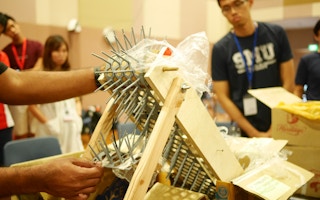Singapore is positioning itself as a leader in the development of sustainable cities. One of the ways they are doing so is by considering the implementation of the “circular economy” in Singapore. That is, a variety of business models and industrial processes which do not generate waste by intention or design and conserve natural resources as much as possible.
To continue reading, subscribe to Eco‑Business.
There's something for everyone. We offer a range of subscription plans.
- Access our stories and receive our Insights Weekly newsletter with the free EB Member plan.
- Unlock unlimited access to our content and archive with EB Circle.
- Publish your content with EB Premium.
While high level talks by companies and government are necessary in creating change at the policy and industry level, there also is a need to support innovations for waste reduction from the ground up.
This is where open innovation—which refers to collaboration between different stakeholders to create original or different products and services—can help.
It offers opportunities to reduce R&D costs and bring the innovations to market more quickly compared to traditional R&D processes which can take years. One open innovation platform that has gained popularity in recent year is the hackathon. Hackathons are design sprint-like events in which participants collaborate intensively on solving software related challenge statements.
While there are criticisms that hackathons are not fully able to solve the many structural problems of complex issues such as waste reduction, we at Sustainable Living Lab (SL2), strongly believe that open innovation competitions provide the platform for new ideas to emerge and potentially disrupt the current market. As a social innovation lab that organizes hackathons to tackle a variety of social and sustainability issues, we believe that hackathons are useful for several reasons:
1)Tangible outcomes over a weekend
Designed as a high intensity competition over 24 to 36 hours, participants are challenged to problem solve and take risks in casual environments. Participants need to create actionable solutions within a time constraint. SL2 organized hackathons are specifically focused on hardware prototyping where participants need to create physical prototypes that also incorporate software.
2) Uniting diverse stakeholders
The waste management industry is not one that is commonly understood. Giving hope to the future possibility of long-term collaboration, hackathons can engage the many stakeholders involved in the generation and recycling of waste to integrate a diversity of perspectives into better designed solutions.
3) Community creation and raising awareness
To stay ahead of trends and be connected to innovators, creators and entrepreneurs who potentially could develop the next breakthrough, it is becoming more important for companies to engage and create an innovative community that is interested in the challenges of their sector.
“
While complex issues cannot be solved overnight, open innovation competitions can bring new technologies and talent together to create new ideas that can change the way we view issues such as food waste.
A case study in cross sector collaboration [SEA Makerthon 2016: Singapore]
Food waste, which has emerged as a key environmental concern in recent years, was the chosen topic for the Singapore edition of a regional circular economy themed open innovation competition. As a competition for makers by makers, the SEA Makerthon 2016 brought together the best talents from the region to solve sustainability issues in their own cities through physical prototyping.
In Singapore, SL2 and OneMaker Group, a local makerspace ecosystem developer, organized the SEA Makerthon 2016 to tackle food waste. Held from 24 to 25th of September at the United World College of Southeast Asia at Tampines, this makerthon was targeted at helping companies involved in food waste management solve some of the challenges they face on a daily basis.
While there are many recycling efforts in Singapore, the makerthon, which was supported by Sodexo, Enerprof, and the National Environment Agency among others, is the first few projects to address the challenge of reducing food waste from the moment food is purchased to the time it goes to the trash.
It was important to engage with industry partners such as Sodexo as they bring a industry leader’s perspective to the makerthon by sharing their knowledge from not only serving up to 40,000 meals a day but also from their 40 clients which span across different industries from corporate, education, healthcare to offshore & marine in Singapore.
Sodexo, a world leader in Quality of Life Services, gave participants a deeper understanding of the workflow in an industrial kitchen by facilitating a tour of their kitchen facilities at United World College of Southeast Asia.
Promising ideas to help industry tackle food waste
The diverse teams of designers, entrepreneurs and coders meant that there were many exciting ideas from the makerthon. Among them was Team Fitchen and their IoT food inventory storage management system (IFISMS) that aims to help kitchen staff increase efficiency by eliminating the need for manual stock taking.
The system boasts an integration of sensors and network electronics which transmits various storage data to users through a dashboard and a hologram which can project a 3D image of food contents inside the fridge without the need to open it. They aim to transform traditional industrial kitchens into smart kitchens affordably.
Other notable ideas include the development of a more affordable system of waste detection using technologies such as computer learning and thermal sensing in F&B outlets by Team Experience Kai. Another group, Team JSV created a solution that tackles airline food waste through better understanding of consumer preference and providing choice to consumers at the right intervention points.
While complex issues cannot be solved overnight, open innovation competitions can bring new technologies and talent together to create new ideas that can change the way we view issues such as food waste. Any mindset shift in terms of changing consumer behaviour still requires the partnership and commitment of government, private companies and community.
Melanie Tan is a strategy consultant at SL2. This post was written exclusively for Eco-Business.









